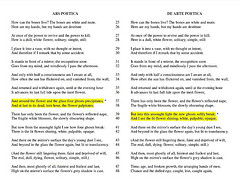|
|
Documenting the quest to track down everything written by
(and written about) the poet, translator, critic, and radio
dramatist, Henry Reed.
An obsessive, armchair attempt to assemble a comprehensive
bibliography, not just for the work of a poet, but for his
entire life.
Read " Naming of Parts."
|
Contact:
|
|
|
|
Reeding:
|
 |
I Capture the Castle: A girl and her family struggle to make ends meet in an old English castle.
|
 |
Dusty Answer: Young, privileged, earnest Judith falls in love with the family next door.
|
 |
The Heat of the Day: In wartime London, a woman finds herself caught between two men.
|
|
|
|
Elsewhere:
|
|
Posts from November 2009
|
|
|
27.4.2024
|
fonds (fôndz; Fr. fôn) n. the entire body of records of an organization, family, or individual that have been created and accumulated as the result of an organic process reflecting the functions of the creator. I work in a library, albeit in a low-level administrative capacity, and I pride myself on knowing the lingo. But I've never come across this term before. Probably because it's been adopted from the French, meaning "foundation" or "groundwork"; a lace-making term. In the archival sense, a fonds is a meta-collection made up of smaller collections of papers and works, all based upon—or originating from—a single source or author.
In the Robin Skelton Fonds, University of Victoria McPherson Library Special Collections, we find this entry for a letter from Henry Reed:
Reed, Henry. 1 in, 1963, als. Includes ts. of poem, "Movement of Bodies" by Reed. With the abbreviations unabbreviated, that translates into: "From Henry Reed: one incoming letter dated 1963, handwritten and signed, which includes a typewritten copy of his poem, ' Movement of Bodies'."
Robin Skelton (1925-1997) was a poet and critic, and a professor of English literature at the University of Victoria, British Columbia. We know him primarily for editing two anthologies which include Reed's poems: The Poetry of the Thirties (Penguin, 1964), and The Poetry of the Forties (1968).
It's easy to imagine that Reed's letter pertains to his inclusion in either anthology, but the typescript of "Movement of Bodies" is problematic: it doesn't appear in either book. The Poetry of the Thirties has an early poem of Reed's, "Hiding Beneath the Furze," and the Forties anthology contains "Naming of Parts," "Judging Distances," "Unarmed Combat," and a lesser-known poem, "The Wall." Perhaps there's something interesting here, or perhaps Skelton just declined to include a fourth Lessons of the War poem.
|
1537. Radio Times, "Full Frontal Pioneer," Radio Times People, 20 April 1972, 5.
A brief article before a new production of Reed's translation of Montherlant, mentioning a possible second collection of poems.
|
Botteghe Oscure was an international, multi-language literary review which ran for twenty-five issues between 1948 and 1960. The title means "dark shops"—named for the street in Rome where the editorial offices were located. Published twice a year in the spring and fall, the journal offered three- and sometimes five-hundred pages of poetry and prose in Italian, French and English, with alternating issues featuring German and Spanish-language segments. It was edited by Marguerite Caetani, the Princess di Bassino.
The second issue of 1948 features "Poeti Inglesi e Americani," and the table of contents reads like Who's Who: with W.H. Auden, Ronald Bottrall, Lilian Bowes Lyon, Jocelyn Brooke, Hamish Henderson, Walter de la Mare, Laurie Lee, C. Day Lewis, Norman Nicholson, Kathleen Raine, Henry Reed, W.R. Rodgers, Edith Sitwell, and Vernon Watkins representing Great Britain; and Conrad Aiken, Leonie Adams, Hayden Carruth, E.E. Cummings, Owen Dodson, Richard Eberhart, Edward Field, Marianne Moore, Theodore Roethke, Karl Shapiro, Theodore Spencer, William Jay Smith, Dunstan Thompson, William Carlos Williams, and Richard Wilbur for the Americans.
Reed's contribution is an obscure poem titled "Ars Poetica," which (I was disappointed to discover) does actually turn up in the Collected Poems, as "De Arte Poetica." The poem is a long meditation on writer's block, regret, and the author's inability to reconcile his past and future. The two versions are not entirely the same, and Reed seems to have made changes following the poem's appearance in print. Jon Stallworthy, in the textual and bibliographical notes for Reed's Collected Poems, tells us:
de arte poetica (? c.1940). Text from an unidentified cutting among HR's papers, with the title 'Ars Poetae' altered as here, and with numerous (? provisional) autograph revisions in the author's earliest—i.e. 1940s—hand. Lines 53-59 are cancelled, but as no replacement lines are offered they have been restored here. [p. 163]
So, it would seem that quaderno due of Botteghe Oscure, secundo semestre 1948, is likely the source of the "unidentified cutting" in Reed's papers, despite the slight divergence in the titles. This could easily be confirmed if the cutting displays the journal's pagination (pp. 262-64), and Kathleen Raine's "Self," on the reverse of the first page. If Reed was making revisions directly on his copy of the version published in 1948, then his amendations may have gone on into the 1950s.
I put together a quick, side-by-side comparison of the two versions of Reed's poem, with the 1948 text on the left side, and Reed's revised version from the Collected Poems on the right. As you can see, everything up to line 36 is exactly the same, he only did away with two couplets, and slightly changed the wording of another to better mate with his changes (.pdf document):
If Reed ever thought of better lines to replace those he "cancelled," they have not been found.
As a multi-lingual literary journal, Botteghe Oscure provides Italian translations of all the poets in this issue, with "Traduzioni a cura di Salvatore Rosati, A.G., Nina Ruffini, Henry Furst, e G.B", in a sort of appendix. Reed's poem is credited as being translated by "A.G." The first issue from 1948 contains an article by the critic and translator Augusto Guidi, so I think it's safe to say he managed the adaptation in Italian.
I'll close here with a few lines from Horace's Ars Poetica, which surely Reed was referencing, and probably knew by heart:
It's not enough for poems to have beauty: they must have
Charm, leading their hearer's heart wherever they wish.
As the human face smiles at a smile, so it echoes
Those who weep: if you want to move me to tears
You must first grieve yourself: then Peleus or Telephus
Your troubles might pain me: speak inappropriately
And I'll laugh or fall asleep. Sad words suit a face
Full of sorrow, threats fit the face full of anger,
Jests suit the playful, serious speech the solemn.
Nature first alters us within, to respond to each
Situation: brings delight or goads us to anger,
Or weighs us to the ground, tormented by grief....
|
1536. L.E. Sissman, "Late Empire." Halcyon 1, no. 2 (Spring 1948), 54.
Sissman reviews William Jay Smith, Karl Shapiro, Richard Eberhart, Thomas Merton, Henry Reed, and Stephen Spender.
|
What makes for a best-selling memoir? Celebrity confessions. Confessions like Mackenzie Phillips reveals in her book, High on Arrival, that she had been involved in an incestuous relationship with her father. Such as Andre Agassi confessing that his trademark long hair was actually a wig and that he used crystal meth, in his forthcoming autobiography, Open.
I confess, I don't actually know what bombshells Reynolds Price may drop in his recent memoir, Ardent Spirits: Leaving Home, Coming Back (New York: Scribner, 2009). I have my library's copy here, on my crowded coffee table. I haven't read it, yet. Not all of it. But I have found a pertinent piece of juicy gossip.
Reynolds Price has been a Professor of English at Duke University for fifty years, and is an award-winning author of fourteen novels. Ardent Spirits is his third memoir, covering his three years as a Rhodes Scholar at Merton College, Oxford, beginning in 1955, until after his return to North Carolina in 1958, when he begins his teaching and writing careers. Price has never written openly about his sexuality until this most recent volume, where he refers to himself (and others) as "queer."
While at Oxford, Mr. Price made the acquaintance of such literary luminaries as W.H. Auden, Stephen Spender, Cyril Connolly, and Helen Gardner—then a fellow at St. Hilda's College. Price attended Gardner's lectures on the metaphysical poets, and her seminar in textual editing, and eventually she would sponsor his thesis on Milton's use of the Chorus in Samson Agonistes.
This is where I get to the juicy part, the bombshell. In the mid-1930s, Henry Reed had been a student of Gardner's while he was doing his graduate studies at the University of Birmingham. Price writes:
Helen Gardner knew her subjects exhaustively and conveyed her mastery in lucid, but never condescending, lectures—one of the rarest of academic skills. She'd nonetheless been subjected to many of the disappointments of a brilliant woman in what was then distinctly a man's world. Stephen Spender would eventually tell me that he'd heard from W.H. Auden that, when she held a job at the University of Birmingham, Gardner fell in love with the poet Henry Reed. Reed, however, was queer; and Gardner's encounter with that reality led to a psychotic breakdown. In the absence of a good biography, I can't vouch for Auden's story; but it has a likely sound, especially since I slowly became aware of her reservations about many of her male colleagues at Oxford, and more than once I heard her cast strong aspersions at Auden and his friends. As her pupil, of course I was fascinated to hear of those possible early troubles in her life. [p. 43]
Wow. This is not the sort of literary footnote I usually get to post. Still, I'm inclined to say Mr. Price's rumor is simple hearsay—an exaggeration as a result of a game of Telephone among poets—considering that Reed sent Gardner a copy of Eliot's "East Coker" in the spring of 1940, and that Gardner, in 1942, credited Reed with a point relating to "The Dry Salvages" (see previously). That hardly sounds like the aftermath of an unrequited love affair and mental breakdown.
|
1535. Reed, Henry. "Talks to India," Men and Books. Time & Tide 25, no. 3 (15 January 1944): 54-55.
Reed's review of Talking to India, edited by George Orwell (London: Allen & Unwin, 1943).
|
|
|
|
1st lesson:
Reed, Henry
(1914-1986). Born: Birmingham, England, 22 February 1914; died: London, 8
December 1986.
Education: MA, University of Birmingham, 1936. Served: RAOC, 1941-42; Foreign Office, Bletchley Park, 1942-1945.
Freelance writer: BBC Features Department, 1945-1980.
Author of:
A Map of Verona: Poems (1946)
The Novel Since 1939 (1946)
Moby Dick: A Play for Radio from Herman Melville's Novel (1947)
Lessons of the War (1970)
Hilda Tablet and Others: Four Pieces for Radio (1971)
The Streets of Pompeii and Other Plays for Radio (1971)
Collected Poems (1991, 2007)
The Auction Sale (2006)
|
Search:
|
|
|
Recent tags:
|
Posts of note:
|
Archives:
|
Marginalia:
|
|










